Mo Ibrahim: RevolutionizingTelecoms & PromotingEffective Governance
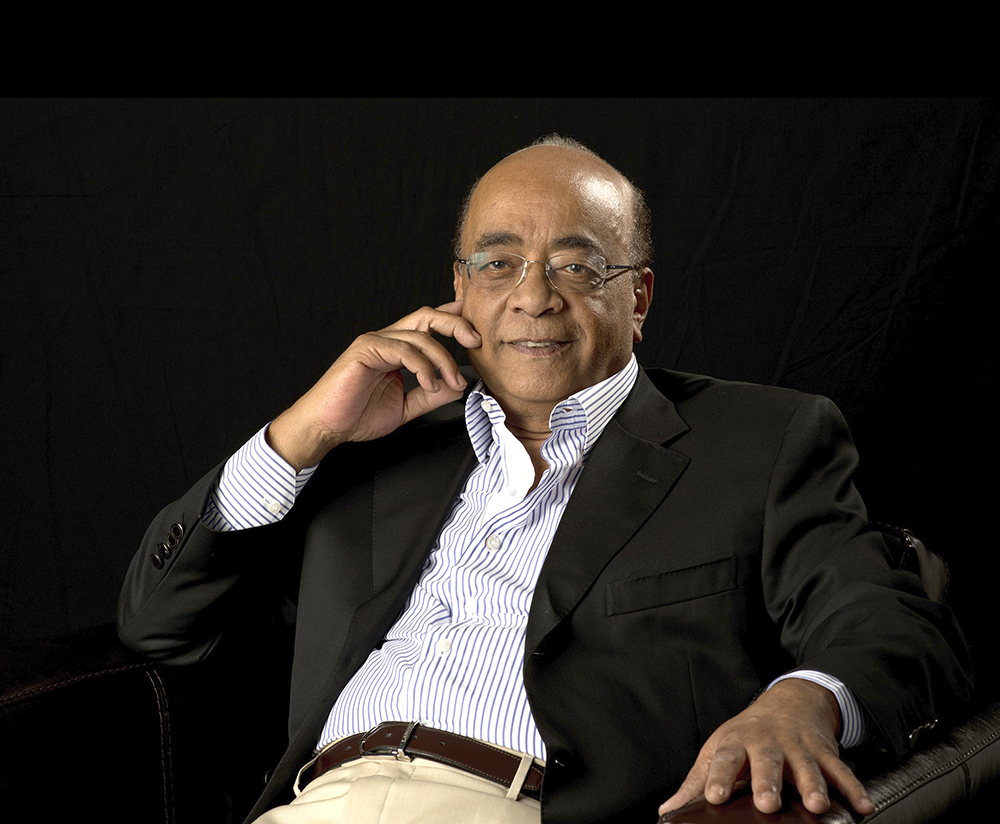
Meet Sir Mohammed Fathi Ahmed Ibrahim KCMG, more commonly known as Mo Ibrahim, a Sudanese-born British entrepreneur and philanthropist who has left a profound mark on the African continent. This Sudanese-British billionaire businessman initially embarked on a career that included employment with various telecommunications firms. Eventually, he founded Celtel, a venture that, upon its sale, boasted an impressive subscriber base of over 24 million mobile phone users across 14 African nations.
Mo Ibrahim is not only the founder of one of Africa’s largest mobile phone companies but also the visionary behind the distinguished Ibrahim Prize for Achievement in African Leadership. His journey is a testament to the transformative power of entrepreneurship and a deep commitment to improving the lives of people across the African continent.
Early Life and Education
Mo Ibrahim, the son of a menial clerk, was born in Sudan on 3rd May 1946 (77 years old) and later moved to Egypt with his family. Mo’s academic journey started in Egypt when he chose to enrol in Alexandria University’s engineering program. This choice would give him essential knowledge that would greatly impact his career in the telecom industry. After completing his undergraduate degree with honors, Mo returned to his native Sudan and started working as an engineer for the state-run telecom provider Sudan Telecom.
Fortunately, Mo Ibrahim had an insatiable curiosity. His academic career took a fresh turn in 1974 when he moved to England. Following his enrollment, he worked hard to earn a master’s degree in electronics and electrical engineering at the University of Bradford. Mo’s unquenchable curiosity took him to the University of Birmingham, where he eventually earned a Ph.D. in mobile communications, but this was only the beginning. He willingly shared his knowledge by teaching at Birmingham, in addition to gaining more information himself.
Entrepreneurial Journey
Mo Ibrahim’s entrepreneurial spirit soared in 1983 when he left academia to become the technical director of Cellnet, which would later become O2, a company responsible for wireless operations in the UK. In 1989, he decided to start his own venture and founded Mobile Systems International, a company specializing in designing mobile networks. In 2000, he sold the company to Marconi, a telecommunications company, for over $900 million.
The Birth of Celtel International: Creating a Mobile Network for Africa
While still involved with Mobile Systems International, Mo Ibrahim recognized a critical gap in the African telecommunications sector – the absence of a pan-African mobile telephone network. In response, he founded MSI Cellular Investments in 1998, later renamed Celtel International. Mo’s vision for Celtel was unique. He established a business plan that was built on the principle of refusing to give or accept bribes – a stark contrast to the standard practices of many African companies.
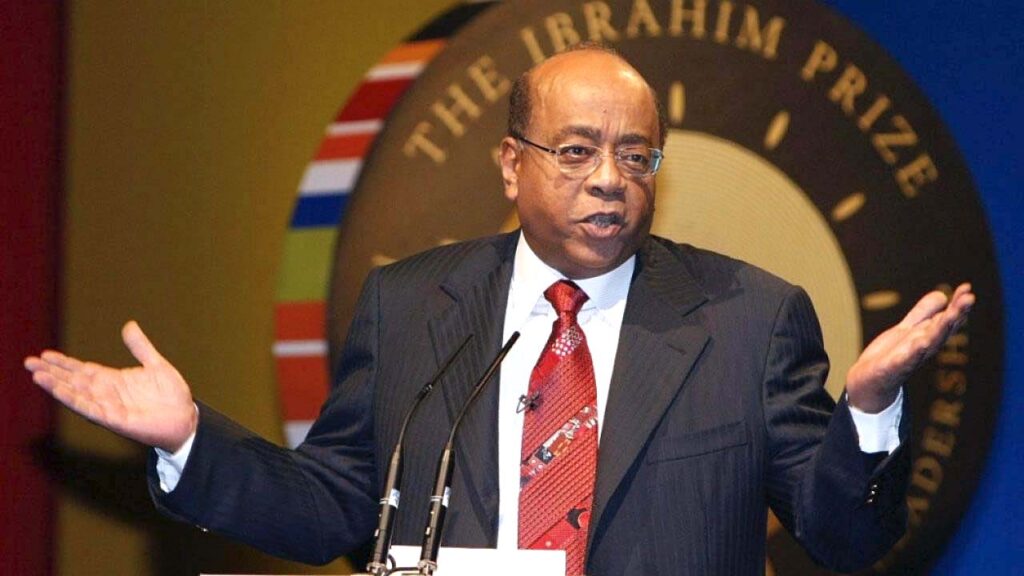
Mo Ibrahim
Celtel’s Rapid Growth
Celtel International embarked on a remarkable journey of rapid expansion, ultimately securing its position as one of Africa’s foremost mobile communications service providers. With their network coverage spanning over a dozen African nations, Celtel touched the lives of hundreds of millions of individuals. In a monumental business transaction that reverberated through the corporate world, Mo Ibrahim orchestrated the sale of Celtel to MTC Kuwait in 2005, commanding an astonishing $3.4 billion for the company. Remarkably, he remained at the helm as the company’s chairman until his well-deserved retirement in 2007.
At the time of this momentous sale, Celtel’s operational footprint extended across 15 African countries, operating under licenses that encompassed more than a third of the continent’s population. The company had dedicated over $750 million in investments in Africa, a testament to their commitment to delivering the advantages of mobile communications to millions of people across the continent.
An Investment in Africa’s Future: Satya Capital Limited
Beyond the world of technology and telecommunications, Dr. Mo Ibrahim’s influence extends into the world of investment. He is the Founding Chairman of Satya Capital Limited, a private investment firm primarily focused on Africa. Through this endeavor, he continues to drive economic growth and development across the continent.
Philanthropic Efforts
After his successful entrepreneurial journey, Ibrahim turned his attention to investing and philanthropy. In 2006, he founded the Mo Ibrahim Foundation to promote good governance in African countries. The foundation introduced the Ibrahim Index, a rating system that holds governing bodies accountable. Additionally, the foundation awards the Ibrahim Prize to African leaders who meet the established standards. The prize, valued at $5 million, is the largest individual prize in the world.
Continued Impact
Dr. Mo Ibrahim is not only an expert in mobile communications but also a passionate advocate for African development and governance. He has played a leading role in various global initiatives and has received recognition for his contributions. TIME magazine listed him as one of the 100 most influential people in the world. He has also been honored with numerous awards and honorary degrees from prestigious academic institutions.
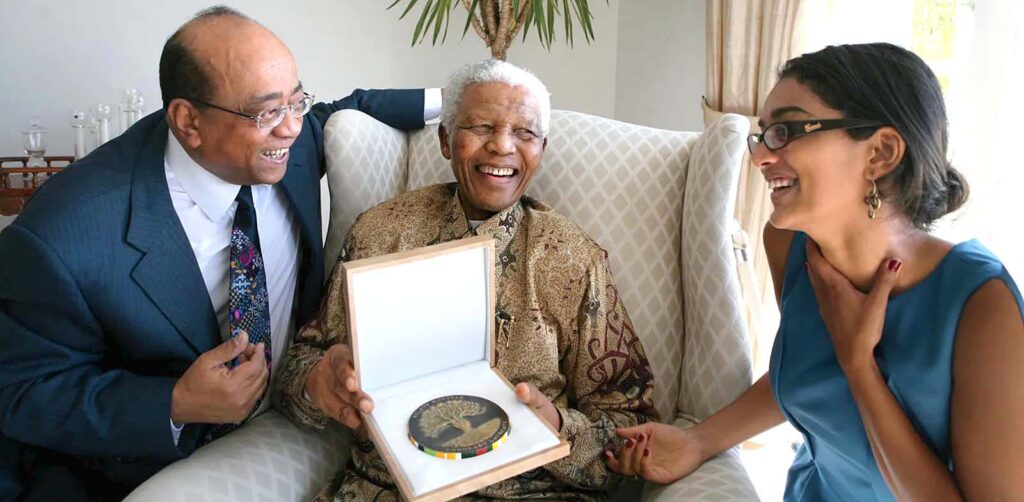
Recognitions and Honors
Dr. Ibrahim’s remarkable achievements are underscored by the many honorary degrees and fellowships bestowed upon him by renowned academic institutions. His accolades include recognition from esteemed universities such as the University of Birmingham, Bradford University, De Montfort University – Leicester, Imperial College – London, London Business School, Oxford University, Royal Academy of Engineering, SOAS – University of London, University of Pennsylvania, and Lancaster University.
In addition to his academic recognition, Dr. Ibrahim has been the recipient of numerous prestigious awards. Notable among these are The GSM Association’s Chairman’s Award for Lifetime Achievement in 2007 and the Economist Innovation Award for Social & Economic Innovation in the same year. In 2008, he was honored with the BNP Paribas Prize for Philanthropy, and in 2009, he received the Oslo Business for Peace Award.
The accolades continued with the Raymond Georis Prize for Innovative Philanthropy in Europe in 2010, followed by the Clinton Global Citizen Award and the Millenium Excellence Award for Actions in Africa in 2010 and 2012, respectively. In 2012, Dr. Ibrahim was also recognized with the David Rockefeller Bridging Leadership Award, and in 2013, he received the Africare
Leadership Award.
In June 2013, he was honored with the Kiel Institute Global Economy Prize, and in May 2014, he received the Eisenhower Medal for Distinguished Leadership and Service. The Foreign Policy Association Medal was presented to him in June 2014, and in 2015, he was awarded the International Republican Institute (US) Freedom Award as well as the Danish CSR Honor Prize.
Dr. Ibrahim’s commitment to philanthropy and leadership was further acknowledged with a second David Rockefeller Bridging Leadership Award in 2017. In 2023, he was appointed Knight Commander of the Order of St. Michael and St. George (KCMG) in the New Year Honours, recognizing his outstanding contributions to charity and philanthropy.
Shaping Africa-Europe Relations
Dr. Mo Ibrahim’s commitment to forging strong ties between Africa and Europe is exemplified through his role as the Co-founder and Co-chair of the Africa Europe Foundation. Launched in 2020, this foundation aims to reset and strengthen Africa-Europe relations, furthering the vision of a united and prosperous future for both continents.
Ibrahim Index of African Governance (IIAG): Exploring Africa’s Governance through the Lens of IIAG
Introduction to the IIAG
The Ibrahim Index of African Governance, initiated by the Mo Ibrahim Foundation, is a valuable resource that plays a pivotal role in assessing governance across the African continent. Established in 2007, this index provides a holistic approach to measuring the quality of governance in African countries. By offering a data-driven evaluation, it has become a key reference point for scholars, policymakers, and anyone interested in the progress of African nations.
Methodology and Metrics
The IIAG employs a meticulous methodology that encompasses four key categories and 102 indicators to assess governance. These categories are:
Safety and Rule of Law: This category evaluates factors like personal safety, the rule of law, and the security of property and human rights in a country. It’s an essential component in understanding the overall governance climate.
Participation and Human Rights: Participation and respect for human rights are crucial indicators of good governance. The IIAG measures these aspects, including the freedom of expression, assembly, and association.
Sustainable Economic Opportunity:
Economic conditions and opportunities are central to the well-being of any nation. The IIAG examines economic factors, including infrastructure, business environment, and public management.
Human Development: Human development indicators, such as health, education, and welfare, provide insights into the overall quality of life. The IIAG considers these aspects in its evaluation.
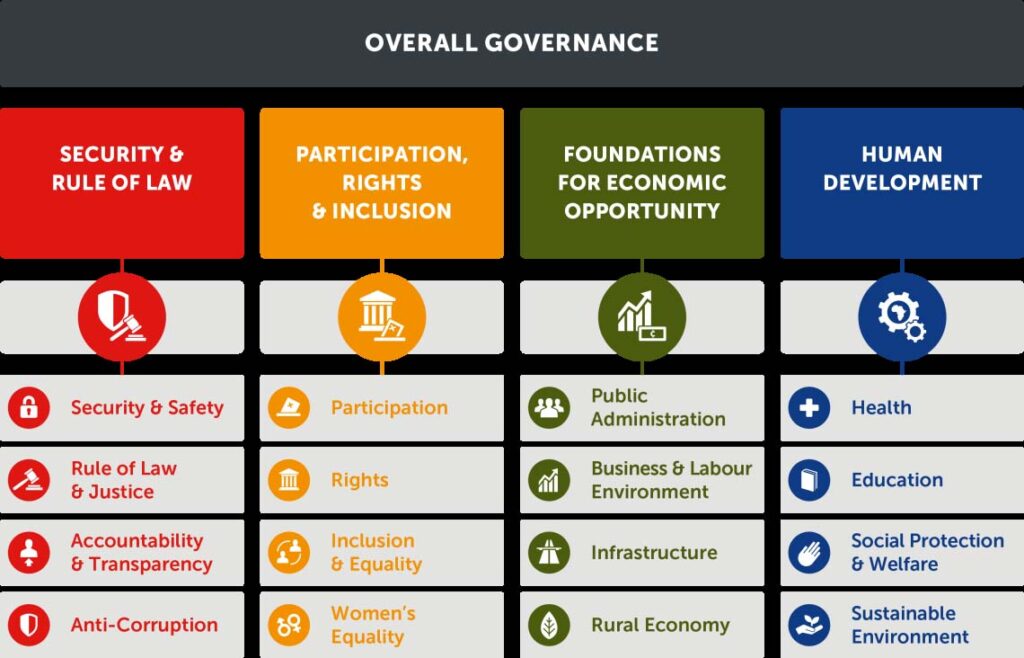
Data Collection and Analysis
The IIAG’s data collection process is thorough and consistent, relying on multiple sources, including reputable institutions like the World Bank, African Development Bank, and the United Nations. This extensive data pool ensures the accuracy and reliability of the index’s findings.
To further elucidate the data collection process, we can represent it graphically as follows:
This diagram illustrates the flow of data from various sources to the final IIAG report, demonstrating the meticulous nature of the process.
Importance and Implications
The IIAG holds a significant position in assessing governance in Africa. By providing a detailed and multidimensional perspective on the state of governance, it serves several critical purposes:
Accountability: It holds governments accountable for their performance in key governance areas, driving improvements in governance quality.
Policy Formation: Policymakers rely on the IIAG to identify areas that require attention and policy reform, leading to enhanced governance structures.
Investor Confidence: The IIAG’s insights are invaluable to investors looking to allocate resources in African countries, promoting economic growth and development.
Highlighting Africa’s citizens’ voices
As citizens stand as the ultimate beneficiaries of public leadership and governance, the evaluation of governance performance must be firmly grounded in outcomes for the people and should not solely rely on official or expert assessments.
Since the inception of the IIAG, the Mo Ibrahim Foundation (MIF) has been actively collaborating with Afrobarometer, the premier pan-African research institution that conducts surveys to gauge public sentiment on the continent. The 2020 IIAG framework further elevated the prominence of these efforts. Previously scattered throughout various aspects of the IIAG, citizens’ evaluations of different governance aspects are now prominently featured in a dedicated section. This section serves as a comprehensive “reality check” to complement the IIAG’s findings.
This section mirrors the IIAG’s categories and offers public perception data on aspects closest to the IIAG’s metrics, establishing itself as a crucial reference within the IIAG.
It allows for the contextualization of results in the real-world context, as perceived by the citizens. It is important to note, however, that these scores are not factored into the calculation of the Overall Governance score.
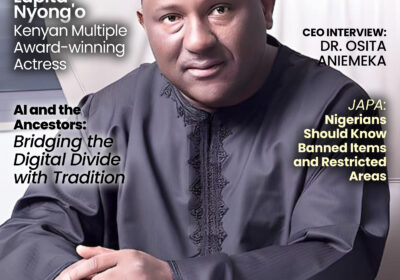

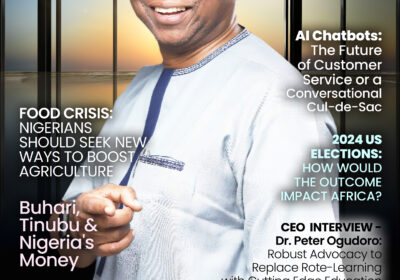
Leave a Reply